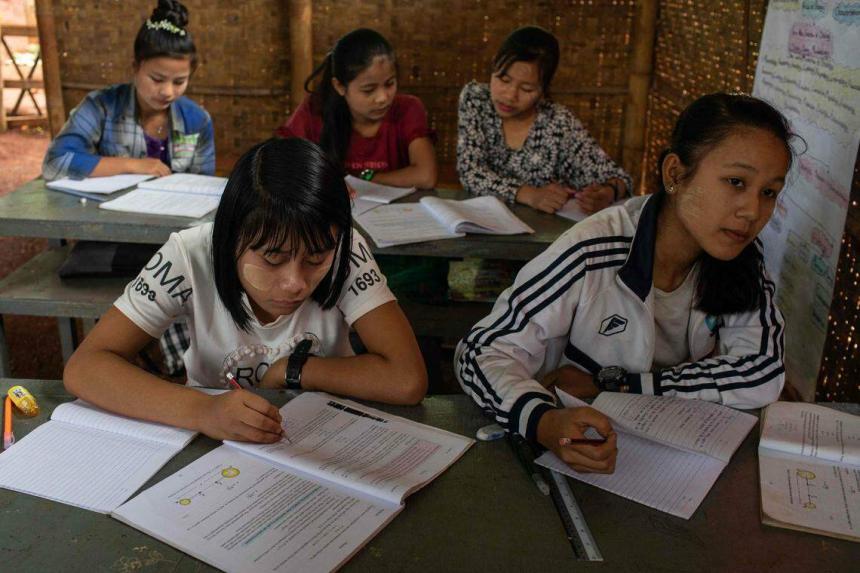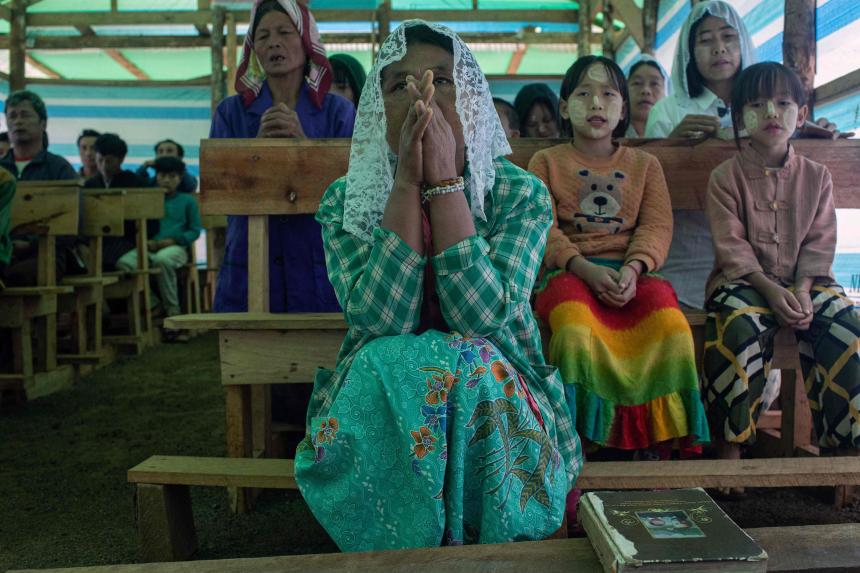DEMOSO, Myanmar - A woman rings a bell outside a makeshift church of wood and tarpaulin, calling the faithful to worship – a respite from war in eastern Myanmar’s Kayah state.
Thousands of young people fled from Myanmar’s cities to Kayah’s rugged hills and jungle as the army launched a crackdown on pro-democracy protests following its 2021 coup.
Many volunteered for military training at hidden camps run by People’s Defence Force groups, and have since fought the junta across the Christian-majority state.
The junta has battered Kayah with artillery and air strikes from its Russian and Chinese-built jets, and more than 100,000 people are now displaced in the state, according to the United Nations.
A dirt path in Demoso township runs to one of the many new camps that have sprung up, where inhabitants pray, teach and eat under threat from the skies.
Mr Mar Thi Yar, 45, says he is proud of the local church, with its roof of green tarpaulin and a makeshift altar decorated with tinsel that inhabitants built last summer.
“It shows our togetherness,” he told AFP in October. “We only have God to rely on in our lives.”
Every evening, the church is busy, he added.
At another camp, Ms Daw Yit, 27, teaches at the school she helped found last December to serve 72 displaced students.
Constantly listening for the sounds of jets and shells makes it hard to teach as she would like, she said.
“There is no mental security for us and we can’t teach well,” she told AFP.
“While we are teaching, we have to be ready to run and hide if the jet fighters come.”
Near the school, a network of trenches dug in the reddish earth provides rudimentary shelter from the military air and artillery strikes that are an ever-present threat.

“My son jumps every time he hears a loud noise,” Ms Daw Yit said.
“Even a one-year-old kid knows how to react – she puts her hands over her ears whenever she hears ‘jet fighters are coming’.”
Amnesty International said in 2022 that the junta was likely using air strikes as “collective punishment” against civilians supporting anti-coup fighters in hot spots like Kayah.
“There are no safe places nearby for all the people in the camp,” said Mr Aung Khet, a member of the committee that runs the camp where he has lived since May 2022.
“Usually, if there is an air strike, we run into the forest to hide.”
Residents also build their shelters far apart from one another, he said.
“If there is an attack by the military, we hope it won’t hit everybody and there will be fewer casualties.”
Good citizens
Inflation and a battered economy, meanwhile, are taxing relief groups’ resources.
“Last year, 300,000 kyat (S$192) was enough to feed 150 people with rice and three meat curries,” Karenni Support Team member Yinn Yinn told AFP.
“But now, that money is only enough for rice and one meat curry for 60 people. Even if there is one meat curry, we have to add potatoes to bulk it out. The prices have doubled since last year.”
“Most families can’t afford” to rebuild their houses, Mr Aung Khet added.
And he says that even if people could, many would not do so until the military has been defeated.
Fighting has flared in Kayah in recent days, with anti-coup fighters spurred on by an offensive launched by an alliance of ethnic minority groups hundreds of kilometres away in northern Shan state.
Analysts say that offensive has put the junta on the back foot.
In Kayah state, the Karenni Nationalities Defence Force is battling the junta for control of state capital Loikaw, and earlier in November said it had shot down a military jet.
The junta said the plane had crashed as a result of engine failure.
As the fighting rages, Ms Daw Yit keeps teaching and trusting in her faith.
“We teach children about the Bible and worship. It’s the way we cure their trauma... I think children have got many traumas during this war,” she said.
“We are taking care of them to be good citizens and I wish they will become leaders who can rule our country well.” AFP

